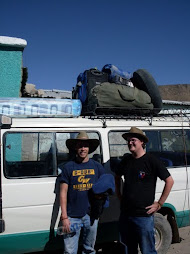Hey all,
Well, I’ve finally gotten a chance to sit down and write topically. I think I’ll tackle what I’ve seen of the school system in this post. I’m working in all levels now, as I’ve mentioned. First off is Inicial, which schools the four and five year olds. They are about as well behaved as young kids everywhere, which is to say not very, and this holds true for all the grades. I had heard that kids were more disciplined here, and they do have a military-like formation at the beginning of the day, complete with many of the movements I myself learned in R.O.T.C. However, that isn’t exactly true, and it’s one of my bigger pains in the rear trying to hold their attention, which makes me truly sorry for the other teachers who don’t have the advantage of being a novelty. Still, there are students that really want to learn, mostly the girls, that make it still worthwhile.
Back to the level-by-level comparison. Anyway, Inicial is the kindergarten/first grade of sorts and I’m still trying to figure out how best to teach them. Using songs, pictures, and employing hands-on activities are the traditional methods and I’m still trying to find the right mix of these. The school resembles what a kindergarten room would in the U.S., although in a building by itself. The next level is Primaria, which has kids from 6-12 years old. Each level has its own room and the military discipline starts here. The school is public but still has strong Catholic influences and some religious education mixed in. Here the teachers are a fun-loving bunch, which means there is always plenty to eat at breaks and unfortunately, some sporadic drinking during the school day, something that apparently isn’t rare here. I wouldn’t say that I have seen any of them drunk, but still it isn’t a very good practice.
The Colegio is the final level, and the last for most Peruvians. It goes from 13-18 years of age. Here the school is even larger, with the biggest contingent of computers, which I’ll probably be teaching with before to long. Here is where I’ll hold my adult English and Computer classes when I start them up next week. Each level in the Colegio has its own room, with the teachers of each subject moving in and out with the hours, the reverse of back home. The same basic subjects are taught here, although I think they stop Math at a level below the U.S. and have religion classes like the Primaria.
Overall my impression of the level of education here is that it is a fairly professional one, with very dedicated teachers, although there are still strides to be made. The resources provided to the Colegio in particular are also quite good, with most of the books being new and each classroom having a whiteboard. The students seem to be more or less the same worldwide, no matter the different disciplinary practices and backgrounds. Teaching is definitely still a wok in progress for me, but each day I spend in the classroom the more I learn how to make my classes more useful and interesting. Hopefully I can strike the right chord with each level and get as many learning as possible…
Saturday, September 27, 2008
Subscribe to:
Post Comments (Atom)

3 comments:
I'm curious, now that you've spent some time immersed in the area. How has your grasp of Spanish improved? Do you still have some problems conversationally, or have you basically gotten used to the language?
My Spanish is definitely improving, although I need to keep from falling into the same language traps because I am so comfortable. Now as for Quechua, the native language...
Thank you for sharing your experiences in Peru, Zach. I read an article about what you are doing in the ISU honors alumni newsletter. I look forward to reading more. Good luck with teaching. It is definitely much more difficult than some people think it is. (But also so much more rewarding than what most people spend their days doing....) Buen suerte! Espero que tu tengas un buen experiencia en Peru. From another former ISU presidential scholar.
Post a Comment